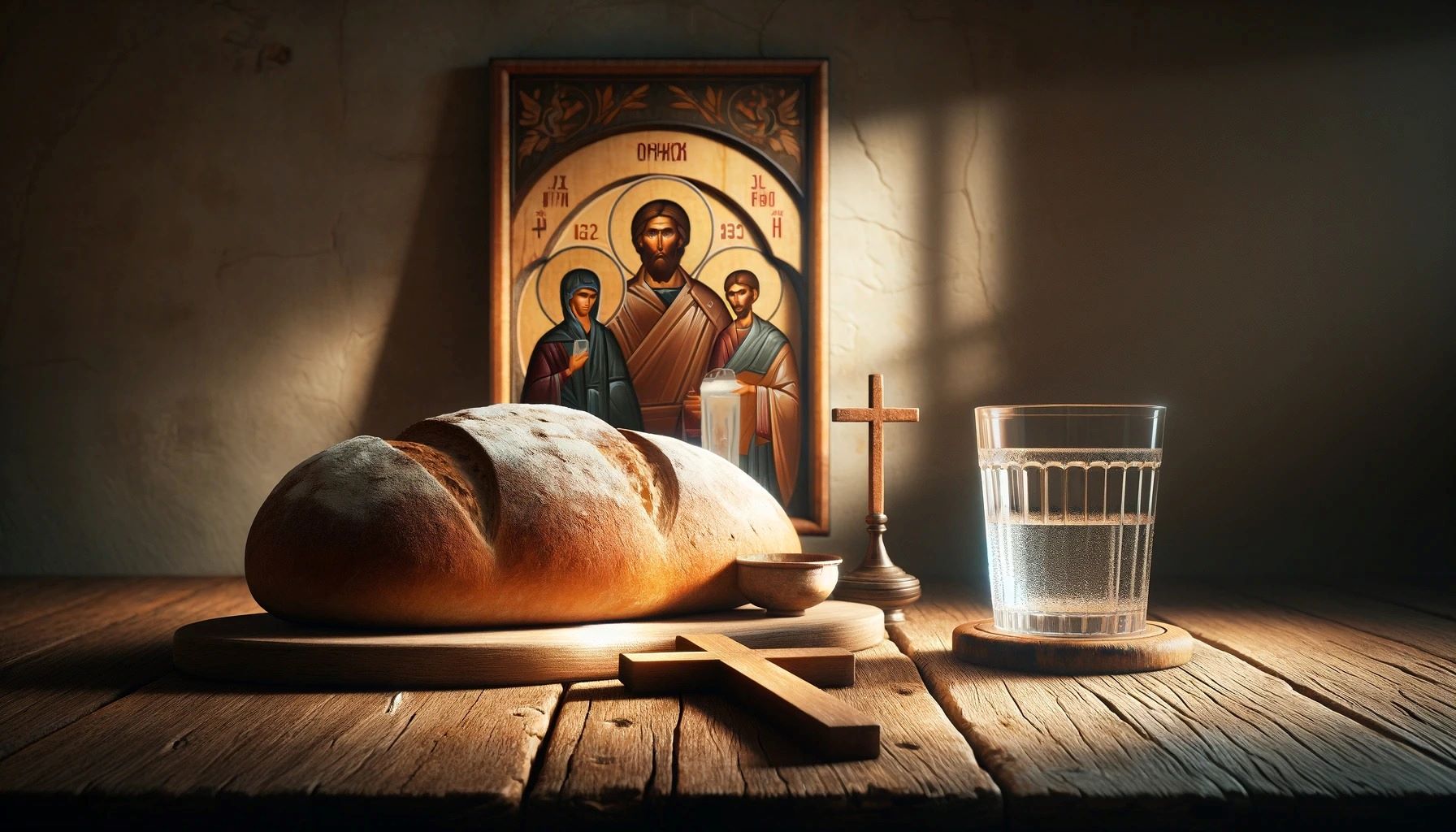Home>Special Themes>Why Are Catholics Allowed To Eat Fish On Fridays During Lent


Special Themes
Why Are Catholics Allowed To Eat Fish On Fridays During Lent
Published: February 27, 2024
Peter Smith, Editorial Director at Christian.net, combines deep insights into faith, politics, and culture to lead content creation that resonates widely. Awarded for his contributions to religious discourse, he previously headed a major organization for religious communicators, enhancing dialogue on faith's societal impacts.
Discover the significance behind why Catholics are permitted to consume fish on Fridays during Lent. Explore the special themes and traditions associated with this religious observance.
(Many of the links in this article redirect to a specific reviewed product. Your purchase of these products through affiliate links helps to generate commission for Christian.net, at no extra cost. Learn more)
Table of Contents
The History of Lent in the Catholic Church
-
Lent has been observed by Christians for centuries, with its origins dating back to the early days of the Church. The word "Lent" itself comes from the Old English word "lencten," which means spring. This period of fasting and reflection has been an integral part of the liturgical calendar for Catholics, symbolizing the 40 days Jesus spent fasting in the desert.
-
The practice of Lent can be traced back to the Council of Nicaea in 325 AD, where the 40-day period of fasting and repentance was established. Over time, Lent has evolved to include various traditions such as prayer, fasting, and almsgiving. It is a time for Catholics to prepare for the celebration of Easter, the most important feast in the Christian calendar.
-
Throughout history, the observance of Lent has been a time for spiritual growth and renewal. It is a period of self-examination and repentance, as well as a time to focus on prayer and charitable acts. The Lenten season is a reminder of the sacrifices made by Jesus Christ and an opportunity for Catholics to deepen their faith and spiritual discipline.
The Tradition of Abstaining from Meat on Fridays
-
The tradition of abstaining from meat on Fridays has been a longstanding practice in the Catholic Church. This custom has its roots in the early days of Christianity when Fridays were designated as a day of penitence to commemorate the crucifixion of Jesus Christ. By refraining from consuming meat, Catholics participate in the sacrifice of Jesus and express their solidarity with His suffering on the cross.
-
Abstaining from meat on Fridays is a way for Catholics to engage in self-discipline and spiritual reflection. By giving up something as fundamental as meat, individuals are reminded of the significance of sacrifice and are encouraged to focus on prayer and acts of charity. This tradition serves as a tangible reminder of the importance of penance and the need for spiritual renewal.
-
The practice of abstaining from meat on Fridays also fosters a sense of community and solidarity among Catholics. By collectively observing this tradition, individuals come together in a shared expression of faith and devotion. It reinforces the communal aspect of the Catholic faith and emphasizes the importance of shared values and practices within the Church.
-
While the tradition of abstaining from meat on Fridays has evolved over time, its underlying purpose remains rooted in the principles of self-denial and spiritual growth. By adhering to this practice, Catholics are reminded of the significance of sacrifice and are encouraged to deepen their commitment to their faith. The tradition of abstaining from meat on Fridays serves as a powerful symbol of devotion and a means of fostering spiritual discipline within the Catholic community.
The Exception for Fish in Catholic Dietary Restrictions
-
The tradition of abstaining from meat on Fridays during Lent is a well-established practice in the Catholic Church. However, there is an exception to this rule when it comes to consuming fish. While Catholics are required to abstain from meat, including beef, pork, and poultry, they are permitted to eat fish as part of their dietary restrictions during Lent. This exception has its roots in both historical and symbolic significance within the Catholic tradition.
-
The exception for fish can be traced back to the early centuries of Christianity when meat was considered a luxury, and fish was a more common and accessible food source for many people, especially those living near bodies of water. As a result, the Church granted an exemption for fish to ensure that individuals of all social and economic backgrounds could participate in the Lenten dietary restrictions. This exception reflects the Church's commitment to inclusivity and its recognition of the practical realities faced by its followers.
-
Symbolically, the allowance of fish during Lent holds deeper significance within the Catholic faith. Fish has been associated with spiritual symbolism in Christian tradition, most notably in the context of Jesus' ministry. The miraculous multiplication of loaves and fishes, as well as the significance of fish in the calling of the apostles, has contributed to the symbolic importance of fish within the Christian narrative. As a result, the consumption of fish during Lent serves as a reminder of these spiritual connections and the broader symbolism of fish in the Christian tradition.
-
Additionally, the exception for fish aligns with the historical practices of fasting and abstinence. While meat was considered a staple food source, fish was often viewed as a less indulgent option, making it a suitable choice for days of fasting and abstinence. This historical context has contributed to the continued allowance of fish during Lent, as it aligns with the principles of self-discipline and moderation that are central to the Lenten observance.
-
The exception for fish in Catholic dietary restrictions during Lent reflects a combination of historical, practical, and symbolic considerations within the Church. By permitting the consumption of fish while abstaining from other meats, the Catholic tradition acknowledges the diverse circumstances of its followers, embraces the symbolic significance of fish in Christian history, and upholds the principles of fasting and abstinence. This exception serves as a nuanced expression of the Catholic faith's commitment to spiritual discipline, inclusivity, and the preservation of tradition.
The Symbolism of Eating Fish on Fridays During Lent
-
Biblical Symbolism: In the biblical context, fish holds significant symbolism within the Christian tradition. The Gospels recount several instances where fish are prominently featured in the ministry of Jesus Christ. The miraculous multiplication of loaves and fishes to feed the multitude, as well as the symbolism of fish in the calling of the apostles, underscores the spiritual significance of fish in Christian narrative. Therefore, the consumption of fish during Lent serves as a tangible connection to these biblical accounts, reminding Catholics of the divine presence and providence in their lives.
-
Spiritual Renewal: The act of consuming fish on Fridays during Lent is symbolic of spiritual renewal and transformation. Fish, as a food source that dwells in water, represents a connection to the spiritual realm. In Christian symbolism, water is often associated with purification and rebirth, reflecting the spiritual cleansing and renewal that Lent embodies. By partaking in fish during this period, Catholics symbolically align themselves with the themes of repentance, purification, and spiritual growth that characterize the Lenten season.
-
Sacrificial Symbolism: The choice to eat fish on Fridays during Lent also carries sacrificial symbolism. While fish is permitted, it represents a form of abstinence from the consumption of other meats. This act of self-denial and sacrifice aligns with the broader Lenten emphasis on penance and spiritual discipline. By choosing fish over other meat options, Catholics symbolically participate in the sacrificial nature of Lent, embracing the call to deny oneself and focus on spiritual contemplation and growth.
-
Community and Solidarity: The symbolism of eating fish on Fridays during Lent extends to the communal and solidarity aspects of the Catholic faith. As Catholics collectively observe this tradition, the act of consuming fish becomes a shared expression of faith and devotion. It fosters a sense of unity and solidarity within the faith community, reinforcing the shared values and practices that bind Catholics together. The symbolism of fish consumption during Lent serves as a reminder of the communal nature of the Lenten observance and the importance of shared spiritual experiences within the Church.
-
Environmental Stewardship: Beyond its spiritual symbolism, the tradition of consuming fish during Lent also aligns with principles of environmental stewardship. Fish, as a sustainable and ecologically conscious food choice, reflects a commitment to responsible consumption and care for the natural world. This aspect of symbolism underscores the holistic approach to Lenten observance, encompassing not only spiritual reflection but also ethical considerations related to food choices and environmental impact.
In summary, the symbolism of eating fish on Fridays during Lent encompasses biblical, spiritual, sacrificial, communal, and environmental dimensions. It serves as a multifaceted expression of the Lenten journey, connecting Catholics to their faith, their community, and the broader themes of renewal and sacrifice.
The Practical Reasons for Allowing Fish Consumption on Fridays
-
Dietary Flexibility: The allowance of fish consumption on Fridays during Lent provides a practical solution for individuals with dietary restrictions or health considerations. For those who may have difficulty obtaining alternative sources of protein or require specific dietary accommodations, the option to consume fish offers a flexible and inclusive approach to adhering to the Lenten dietary guidelines. This practical consideration ensures that individuals with diverse nutritional needs can actively participate in the Lenten observance without compromising their well-being.
-
Cultural and Regional Considerations: The allowance of fish consumption during Lent acknowledges the cultural and regional diversity within the Catholic community. In many regions, fish holds significant culinary and cultural importance, making it a staple food source for local populations. By permitting the consumption of fish, the Church recognizes and respects the dietary traditions and customs of different communities, ensuring that the Lenten observance remains relevant and accessible across diverse cultural contexts. This practical accommodation reflects the Church's commitment to honoring and preserving the rich cultural tapestry of its followers.
-
Economic Accessibility: Historically, fish has been a more economically accessible food source for many individuals, particularly those living in coastal or fishing communities. By allowing the consumption of fish during Lent, the Church addresses economic considerations, ensuring that individuals from varying socio-economic backgrounds can actively participate in the Lenten dietary restrictions. This practical approach aligns with the Church's commitment to inclusivity and ensures that economic disparities do not hinder individuals from engaging in the spiritual practices of Lent.
-
Nutritional Benefits: From a nutritional standpoint, fish offers a valuable source of protein, omega-3 fatty acids, and essential nutrients. By permitting the consumption of fish, the Church acknowledges the nutritional benefits associated with this food choice, particularly in the context of a period of fasting and abstinence. This practical consideration ensures that individuals can maintain a balanced and nourishing diet while observing the Lenten dietary restrictions, promoting both physical well-being and spiritual discipline.
-
Environmental Sustainability: The allowance of fish consumption during Lent also aligns with principles of environmental sustainability. Fish, when sourced responsibly, represents a sustainable and ecologically conscious food choice. By encouraging the consumption of fish, the Church promotes awareness of environmental stewardship and responsible food sourcing practices. This practical consideration reflects a holistic approach to the Lenten observance, encompassing not only spiritual reflection but also ethical considerations related to food choices and environmental impact.
In essence, the practical reasons for allowing fish consumption on Fridays during Lent encompass dietary flexibility, cultural and regional considerations, economic accessibility, nutritional benefits, and environmental sustainability. This practical approach ensures that the Lenten observance remains relevant, inclusive, and mindful of the diverse needs and circumstances of the Catholic community.















